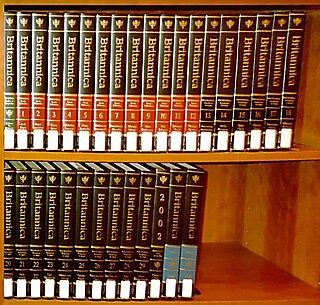
A dictionary is a listing of lexemes from the lexicon of one or more specific languages, often arranged alphabetically, which may include information on definitions, usage, etymologies, pronunciations, translation, etc. It is a lexicographical reference that shows inter-relationships among the data.

An encyclopedia or encyclopaedia is a reference work or compendium providing summaries of knowledge, either general or special, to a particular field or discipline. Encyclopedias are divided into articles or entries that are arranged alphabetically by article name or by thematic categories, or else are hyperlinked and searchable. Encyclopedia entries are longer and more detailed than those in most dictionaries. Generally speaking, encyclopedia articles focus on factual information concerning the subject named in the article's title; this is unlike dictionary entries, which focus on linguistic information about words, such as their etymology, meaning, pronunciation, use, and grammatical forms.
Lexicography is the study of lexicons, and is divided into two separate academic disciplines. It is the art of compiling dictionaries.
Lexicology is the branch of linguistics that analyzes the lexicon of a specific language. A word is the smallest meaningful unit of a language that can stand on its own, and is made up of small components called morphemes and even smaller elements known as phonemes, or distinguishing sounds. Lexicology examines every feature of a word – including formation, spelling, origin, usage, and definition.

The Oxford English Dictionary (OED) is the principal historical dictionary of the English language, published by Oxford University Press (OUP). It traces the historical development of the English language, providing a comprehensive resource to scholars and academic researchers, as well as describing usage in its many variations throughout the world.
Old English, or Anglo-Saxon, is the earliest recorded form of the English language, spoken in England and southern and eastern Scotland in the early Middle Ages. It developed from the languages brought to Great Britain by Anglo-Saxon settlers in the mid-5th century, and the first Old English literary works date from the mid-7th century. After the Norman Conquest of 1066, English was replaced, for a time, by Anglo-Norman as the language of the upper classes. This is regarded as marking the end of the Old English era, since during this period the English language was heavily influenced by Anglo-Norman, developing into a phase known now as Middle English in England and Early Scots in Scotland.
A thesaurus, sometimes called a synonym dictionary or dictionary of synonyms, is a reference work which arranges words by their meanings, sometimes as a hierarchy of broader and narrower terms, sometimes simply as lists of synonyms and antonyms. They are often used by writers to help find the best word to express an idea:
...to find the word, or words, by which [an] idea may be most fitly and aptly expressed

A Dictionary of the English Language, sometimes published as Johnson's Dictionary, was published on 15 April 1755 and written by Samuel Johnson. It is among the most influential dictionaries in the history of the English language.
Nathan Bailey, was an English philologist and lexicographer. He was the author of several dictionaries, including his Universal Etymological Dictionary, which appeared in some 30 editions between 1721 and 1802. Bailey's Dictionarium Britannicum was the primary resource mined by Samuel Johnson for his Dictionary of the English Language (1755).

A Table Alphabeticall is the abbreviated title of the first monolingual dictionary in the English language, created by Robert Cawdrey and first published in London in 1604.
Etymology is the scientific study of the origin and evolution of a word's semantic meaning across time, including its constituent morphemes and phonemes. It is a subfield of historical linguistics, philology, and semiotics, and draws upon comparative semantics, morphology, pragmatics, and phonetics in order to construct a comprehensive and chronological catalogue of all meanings that a morpheme, phoneme, word, or sign has carried across time.

David Crystal, is a British linguist who works on the linguistics of English language.
A pronunciation respelling for English is a notation used to convey the pronunciation of words in the English language, which do not have a phonemic orthography.

John Simpson is an English lexicographer and was Chief Editor of the Oxford English Dictionary (OED) from 1993 to 2013.
Beryl T. "Sue" Atkins was a British lexicographer, specialising in computational lexicography, who pioneered the creation of bilingual dictionaries from corpus data.
Patrick Wyndham Hanks was an English lexicographer, corpus linguist, and onomastician. He edited dictionaries of general language, as well as dictionaries of personal names.

Robert Cawdrey was an English clergyman who produced one of the first dictionaries of the English language, the Table Alphabeticall, in 1604.
Papias was a Latin lexicographer from Italy. Although he is often referred to as Papias the Lombard, little is known of his life, including whether he actually came from Lombardy. The Oxford History of English Lexicography considers him the first modern lexicographer for his monolingual dictionary (Latin-Latin), Elementarium Doctrinae Rudimentum, written over a period of ten years in the 1040s. The Elementarium has been called "the first fully recognizable dictionary" and is a landmark in the development of dictionaries as distinct from mere collections of glosses. Papias arranges entries alphabetically based on the first three letters of the word, and is the first lexicographer to name the authors or texts he uses as sources. Although most entries are not etymological, Papias laid the groundwork for derivational lexicography, which became firmly established only a century later.
Before Samuel Johnson's two-volume A Dictionary of the English Language, published in 1755 and considered the most authoritative and influential work of early English lexicography, there were other early English dictionaries: more than a dozen had been published during the preceding 150 years. This article lists the most significant ones.
A historical dictionary or dictionary on historical principles is a dictionary which deals not only with the latterday meanings of words but also the historical development of their forms and meanings. It may also describe the vocabulary of an earlier stage of a language's development without covering present-day usage at all. A historical dictionary is primarily of interest to scholars of language, but may also be used as a general dictionary.






